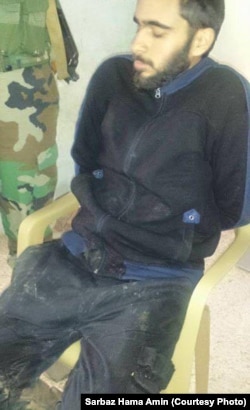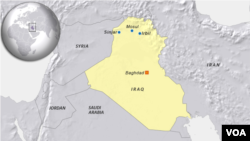Mohamed Khweis’s parents were awakened Monday morning by a VOA reporter and cameraman at the family’s townhouse in Alexandria, Virginia.
The newspeople told them something they never expected to hear: their son was a member of the Islamic State (IS) and he had surrendered to Kurdish forces in Iraq.
"We thought he was in Canada lately,” said a woman who identified herself as Khweis's mother. “We also know he has been traveling to Turkey.”
But the parents had not been in contact with the son for a long time. They had no idea he was in Iraq or had ties with any extremist groups.
The parents said they are of Palestinian background. The father said he came to the U.S. in 1988.
When shown a published photo of Khweis in Kurdish custody , the family said they were not certain it was him.
“The guy in the picture is not my brother,” insisted Tamer Khweis, a college student and a younger brother of Mohammed Khweis.
“There are similarities, but I can’t confirm because the picture isn’t clear,” his mother said.
Khweis' personal belongings might have been stolen and have ended up in Iraq, the family suggested.
Figure on the horizon
Sarbaz Hama Amin, a Kurdish Peshmerga commander in Iraq, told VOA his forces noticed an odd figure while on patrol Monday in northern Iraq, near the town of Sinjar.
“Our Peshmergas who were patrolling the frontline said they saw something unusual and started firing at it. That thing disappeared after we fired at it but our Peshmergas started looking for it. After it became light after 5:00 a.m., he screamed at us and told us in English, ‘Who can talk to me? I want to come to you.’
But our Peshmergas didn’t understand English,” Amin continued. “He spoke a very limited Arabic and asked if anyone spoke English. After Peshmergas made sure he had no explosives on, we arrested him and took him to the camp where he said he wanted to surrender.”
Amin added that the suspect told them his father was Palestinian.
A picture of the suspect’s Virginia state driver’s license, sent to VOA, identifies him as Mohamed Jamal Khweis.
“The fighter might possibly have come from the Talafar town controlled by IS because that place is the closest frontline to us,” Amin said. “He had Turkish money and some dollars. He also had a visa card and an American driver’s license.”
Iraqi Kurdish Peshmerga Gen. Hashem Sitayi told VOA the suspect traveled through Turkey to Syria to join Islamic State.
“It looks like it's still far too easy to get into Syria from Turkey,” Patrick Skinner told VOA. Skinner is an intelligence officer now with The Soufan Group, a strategic security intelligence consultancy. “It shows how hard it is to control or detect movement in places where so many people are moving both in terms of fleeing but also in terms of normal life.”
Skinner added, “It will be important to get his information on his points of contacts before he traveled and on other USCITs [American citizens] he might have seen.”
State Department response
Later in the morning the father, Jamal Khweis, in an exclusive interview with VOA, said he tried to get more information from U.S. authorities.
“I went to the State Department to inquire about my son. They didn’t help. I heading home now,” he said. “My wife said there are cameras and many reporters outside of my house. I won’t talk to reporters until the U.S. government confirms my son’s capture.”
A U.S. State Department official said “We are aware of reports that a U.S. citizen that was allegedly fighting for Da’esh (IS) has been captured by Peshmerga forces in northern Iraq. We are in touch with Iraqi and Kurdish authorities to determine the veracity of these reports.”
Spokesman John Kirby said Monday that over the past several weeks, there have been reports of increasing defections from IS. "Fighters are becoming disenfranchised, certainly disenchanted with the effort that they claimed they signed up for and are, in increasing numbers, deciding to leave the group."
Kirby added that reports indicate IS is increasingly relying on child soldiers. Originally, he said, child soldiers were used as suicide attackers, and "now we get more reports about them using children... in actual engagements, you know, side by side with adult fighters."
VOA’s Sharon Behn and Ali Javanmardi contributed to this report from Irbil. VOA State Department correspondents Nike Ching and Pam Dockins, Rikar Hussein and National Security Correspondent Jeff Seldin contributed from Washington.






